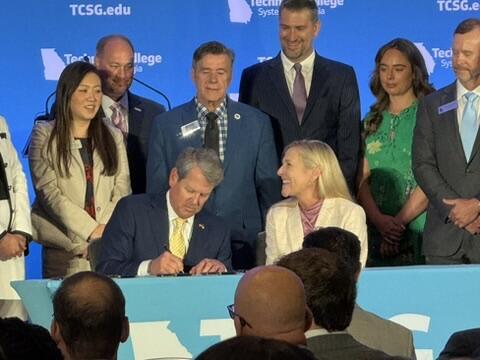
Section Branding
Header Content
Lawmakers Huddle: Kemp’s bill-signing momentum continues ahead of May 14 deadline
Primary Content
LISTEN: Gov. Brian Kemp’s bill-signing momentum continues as his May 14 deadline to sign or veto bills looms closer. Donna Lowry, host of GPB's Lawmakers, gives us the skinny in the latest installment of Lawmakers Huddle.

Gov. Brian Kemp’s bill-signing momentum continues as his May 14 deadline to sign or veto bills looms closer.
He held several bill-signing ceremonies this week in various locations and focused on significant themes such as education.
The host of GPB’s Lawmakers, Donna Lowry, delves into the newly signed laws — and the ones still waiting for the governor’s approval — in this week’s Lawmakers Huddle.
——
Getting a bill passed in the Georgia legislature is sometimes a grueling process of overcoming hurdles. For first-time lawmaker, Democratic state Sen. Rashaun Kemp of Atlanta, the process has proven eye-opening.
"I've worked in government relations," Sen. Kemp said. "Being on this side of things, you realize, it is not easy to pass a bill, you know? It's a lot of steps that go forward in this through the committee process and then the amendments and the changes.
"So I'm very hopeful. I, you know, of course, you know, sitting on pins and needles."
The pins and needles of waiting to see if the governor will sign or veto a bill.
Second-term Republican Rep. Bethany Ballard of Warner Robins is familiar with that uneasy wait time. She has celebrated the passing of her bills in both chambers.
"You feel great, and then you realize you have one more hurdle," Ballard said. "And so it's always just a huge relief and a great, exciting day when the governor signs your bill."
This week, she was elated when Gov. Kemp publicly signed two of her bills during a ceremony at the Capitol. One would expand the pool of psychologists that school districts can hire.
Ballard’s other legislation would help detect dyslexia in children earlier.
"It’s going to get them the help they need," she said. "It's going to create a literacy coach coordinator position and and a committee to help with that so that our teachers get coach coached and get trained so that they are better able to serve our students."
That’s good news for Sen. Rashaun Kemp, whose education bill also received the governor’s signature.
"A portion of that bill was in my original piece of my bill to ban 3Qing to make sure that we are not over-relying on teaching kids how to guess to read," RaShaun Kemp said. "And our main focus should be on the signs of reading. I think that this just kind of adds to that."
The governor also approved education bills to address chronic absenteeism, entice districts to support more charter schools, and increase school safety by requiring tools such as panic buttons.
The more controversial legislation to keep biological males out of womens’ sports will also become law.
The governor signed a few bills in front of hundreds gathered for the Technical College System of Georgia, or TCSG, conference. Gov. Kemp praised the group.
"With enrollment at its highest level since 2013, TCSG has also reached another milestone, the largest graduating class in TCSG history and the highest rate of Enfield job placement ever," Gov. Kemp said. "Congratulations."
Gov. Kemp signed a bill allowing people between 21 and 40 to receive an adult workforce high school diploma from a technical college. He also signed another to strengthen the 2022 law that created a state-funded apprenticeship initiative.
Gwinnett County Sen. Clint Dixon says his bill will increase access.
"They can have, you, those apprentices, but the apprentice had to find a company sponsor, right?" Dixon said. "And so the companies are limited to the amount of apprentices they can have it at any one time. And so basically what the bill does is it allows the technical college system of Georgia, whatever school they're at, they can be the sponsor now."
Dixon says there’s a waiting list of Georgia companies wanting apprentices.
That bill — and most other legislation the governor signs this month — will become laws on July 1 of this year.

